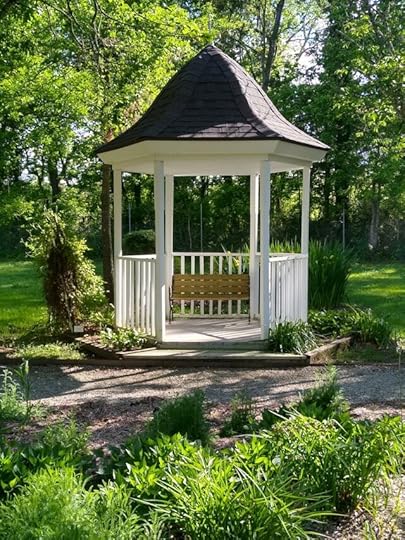Gazebos and Jane Austen – or not
As I write, my partner and I are on holiday in our favourite hideaway, buried in the heart of the Herefordshire countryside. Where we stay is a converted railway station on an extinct country line from Ross-on-Wye that was zapped by the Beeching Report in the 1960s. In its extensive gardens sits a gazebo where, weather permitting, we spend a lot of time chatting, browning our protruding legs and reading.
 Image of a glorious gazebo courtesy of Brice Curry on Unsplash.
Image of a glorious gazebo courtesy of Brice Curry on Unsplash. A book I’ve been rereading here is Sense & Sensibility. Gazebo to me sounds very Jane Austen, just as a ha-ha does. But, disappointingly, a website that’s a thesaurus of every word she ever used assures me gazebos do not figure in her writings (but I’m happy to be corrected if someone tells me they do, and where). Nevertheless, I maintain it’s the sort of word that ought to have occurred, redolent as it is of some of the country estates — Mansfield Park, Barton Park, etc. – she set her comedies of manners in. Otherwise, you might think I was merely clickbaiting you.
And speaking of Mansfield Park, thanks to one of my readers, I am reminded that Austen situates a ha-ha at the grand mansion that is Sotherton, home of Maria Bertram’s betrothed, James Rushworth. On a walk in the grounds, Maria and Henry Crawford are determined to reach a knoll in the ‘park’, but the gate to the park is locked. Maria, egged on by Henry, decides she can slip round it, which horrifies her strait-laced cousin Fanny:
“You will hurt yourself, Miss Bertram,” she cried; “you will certainly hurt yourself against those spikes; you will tear your gown; you will be in danger of slipping into the ha-ha. You had better not go.”
The blindingly obvious phallic imagery of the spike tearing a gown, and symbolically, Maria’s virginity, foreshadows the disgrace caused by her later elopement with Henry Crawford.
Which language?Which language do you think gazebo comes from? Perhaps Italian, because of it’s –o ending, like piano or casino or ghetto? Or maybe Spanish? Or even Arabic, a gazebo being a bit like a tent travellers across the sands might pitch?
If it’s possible to describe words as ‘made up’, this one certainly fits that bill. It’s probably an invention based jestingly on Latin: it jokingly conjugates to gaze as if it were a Latin verb gazēre, ‘I shall gaze’, in the first-person singular future indicative.
No doubt, whoever first coined it and the people who first heard it thought it a terrifically clever learned wheeze. The OED first cites it from 1741, well before Jane Austen’s birth (1775), in a work by the Irishman Wetenhall Wilkes titled An Essay on the Pleasures & Advantages of Female Literature:
Unto the painful summit of this height | A gay Gazebo does our Steps invite. | From this, when favour’d with a Cloudless Day, | We fourteen Counties all around survey.
Mr Wilkes was clearly a bit of a mansplainer avant la lettre. Another work of his was A letter of genteel and moral advice to a young lady: being a system of rules and informations, digested into a new and familiar method, to qualify the fair sex to be useful, and happy in every scene of life.
His poetic lines display one meaning of gazebo, ‘A turret or lantern on the roof of a house, usually for the purpose of commanding an extensive prospect’ as the OED puts it. But nowadays the word means a roofed or tented structure in a garden, with open sides to provide shelter from the elements while allowing a view from within. These can be pop-up affairs with a canvas or similar roof, to provide shelter on beaches or in gardens, or sturdy, solid constructions, like ours, with its wooden posts, beams and roof.
If mock-Latin is indeed its origin, gazebo is not the only first-person singular future indicative Latin verb lurking in English. If you visit ruined monasteries, as we often do, the guidebook may draw your attention to a lavabo for the monks, a trough or basin for them to wash their hands in, sometimes built into a wall and furnished with a water supply and a drain. Wenlock Abbey has a notable free-standing one.
Lavabo, the physical object, comes from the earlier lavabo, the ritual washing of hands by the priest during celebration of the Eucharist, at which he recited Lavabo inter innocentes manus meas, ‘I shall wash my hands among the innocent’ (Psalm 26:6ff.). Since Vatican II, this has been replaced by Lava me, Domine, ab iniquitate mea, et a peccato meo munda me (‘Lord, wash away my iniquity; cleanse me from my sin’).
Lavabo is from a first conjugation Latin verb. Two more futures from the second conjugation are placebo and nocebo. I’ll come back to them in the next post.



